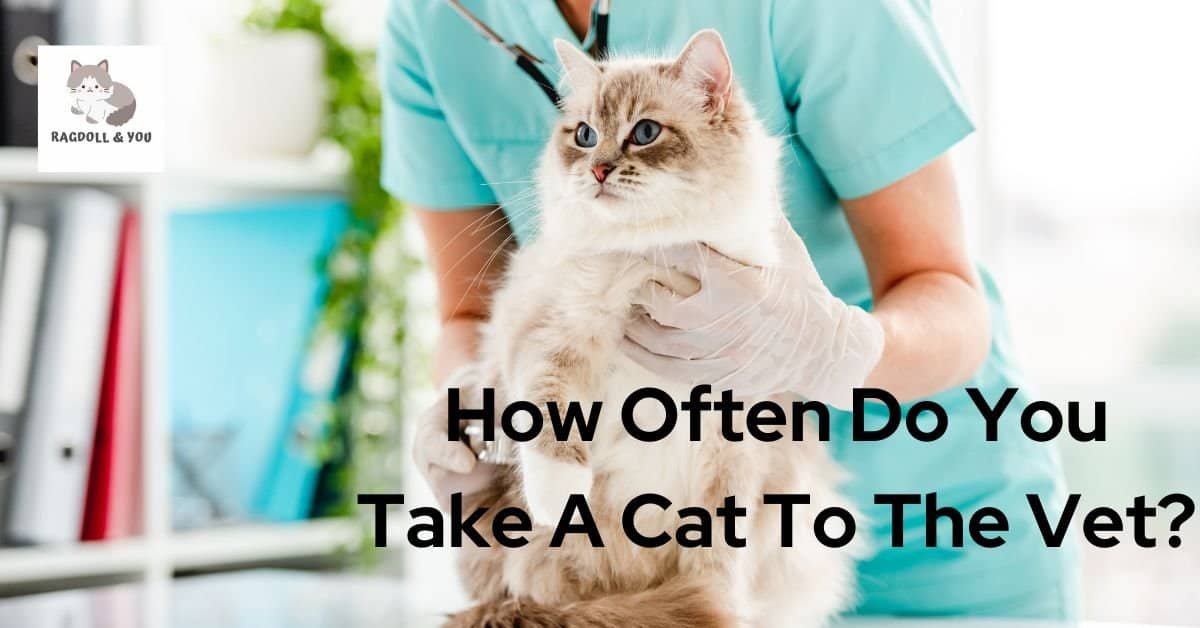How Often Do You Take A Cat To The Vet? ( 2023 Edition )
Are you a new cat owner wondering how often your feline friend should see the vet? According to the American Animal Hospital Association, all pets should have at least an annual check-up.
This blog post will provide in-depth information about kitten, adult, and senior cat vet visits – from reasons for these appointments to recognizing signs your kitty may be unwell.
Stay with us as we delve into this essential pet care topic!
Frequency of Vet Visits Based on Cat’s Age
Kittens should be taken to the vet more frequently, usually every 3-4 weeks until they are about four months old. Adult cats typically require annual checkups, while senior cats may need biannual visits for health screenings and monitoring.

Kitten Vet Visits
Kittens need a vet soon after you bring them home. They get their first vaccines when they are 6 to 8 weeks old. These shots keep going until the kitten is about 4 months old. At three months, kittens also get a rabies shot.
Then they get another shot after one year and then every three years. The vet will look at your kitten’s body and talk about how to stop fleas and ticks. Your kitten may also need treatment for worms.
When kittens turn six months old, it’s time to think about getting them spayed or neutered.
Adult Cat Vet Visits
Taking your adult cat to see the vet each year is very important. The American Animal Hospital Association says this too. At these visits, the vet may give your cat new vaccines or update old ones.
These can guard against sicknesses like feline leukemia and rabies.
A physical exam helps find health problems early on. If a cat is sick, it’s better for the vet to catch it soon. So, an annual check-up for cats between 6-8 years old is a good idea.
Senior Cat Vet Visits
Older cats need to see the vet more often. At least twice a year is good for most senior cats. Some may even need more trips. Cats that are 8-10 years old or older can have health problems like kidney disease and diabetes.
Vet visits help find these issues early. Your cat will get blood work at these visits too. Lab work checks your cat’s organs to make sure they’re working okay. The vet may also give a rabies vaccine booster if it’s needed.
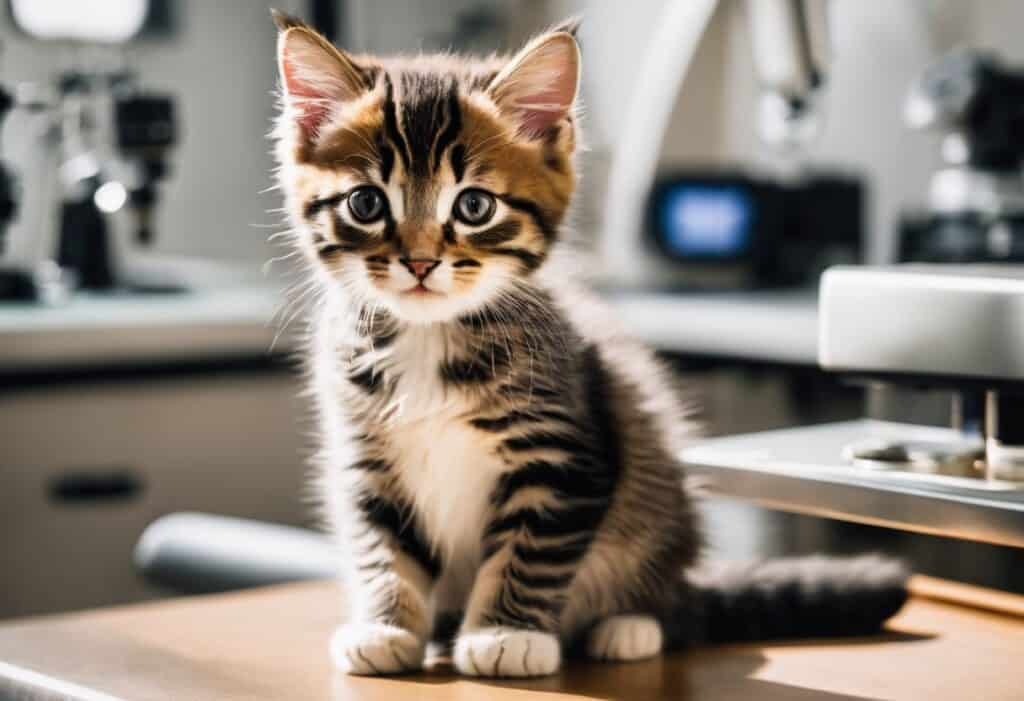
Essential Reasons for Cat Vet Visits
Cats should visit the vet regularly for annual checkups, wellness checks, behavioral issues, and pet emergencies.
Annual Checkups
Annual checkups are an important part of keeping your cat healthy. The American Animal Hospital Association recommends taking your cat to the vet for a checkup every year. During these visits, the veterinarian will perform a thorough examination, including checking your cat’s weight, heart rate, and overall health.
They may also administer any necessary vaccinations or discuss preventive measures such as flea and tick prevention. Annual checkups help detect any potential health issues early on and allow for prompt treatment if needed.
So make sure to schedule those yearly vet visits for your furry friend!
Wellness Checks
Regular wellness checks are an important part of keeping your cat healthy. According to the American Animal Hospital Association, cats should see a veterinarian at least once a year.
During these visits, the vet will perform a thorough physical examination and discuss any concerns or changes in behavior. They may also recommend vaccinations, blood tests, and preventive treatments for parasites like fleas and ticks.
Wellness checks help detect early signs of illness or disease so that they can be treated before they become more serious. By taking your cat for regular check-ups, you can ensure their overall well-being and catch any health issues early on.
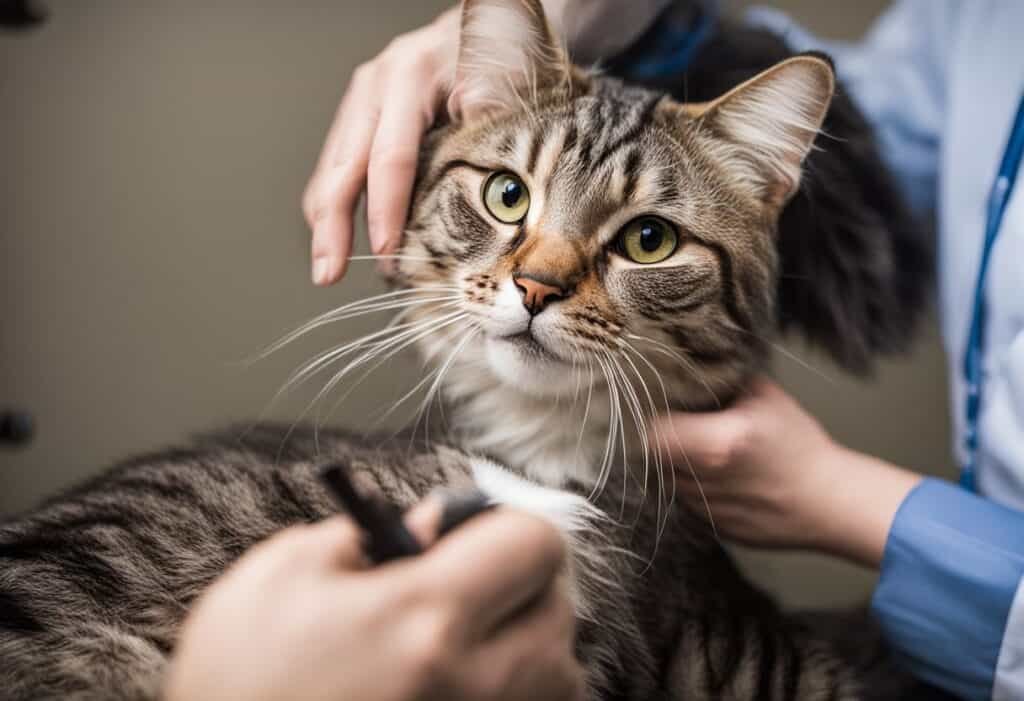
Behavioral Issues
Behavioral issues are one of the essential reasons why you should take your cat to the vet. It’s important to remember that sudden changes in behavior can be a sign of an underlying health problem.
If your cat is acting differently, such as being more aggressive or avoiding interaction, it’s crucial to have them checked by a veterinarian. Additionally, behavioral issues like litter box problems or excessive scratching may indicate medical conditions that need veterinary attention.
So don’t ignore behavioral changes in your cat and make sure to schedule a vet visit if you notice anything unusual. Remember, addressing these issues early on can help improve your cat’s overall well-being and prevent any further complications.
Pet Emergencies
In a pet emergency, it’s important to act quickly and get your cat the veterinary attention they need. Signs of a pet emergency can include difficulty breathing, severe injuries, seizures, or sudden collapses.
If you notice any of these signs, don’t hesitate to contact your vet or an emergency animal hospital right away. It’s also a good idea to have a plan in place for emergencies and know where the nearest 24-hour veterinary clinic is located.
Remember, early intervention can greatly improve the chances of successful treatment and recovery for your furry friend.
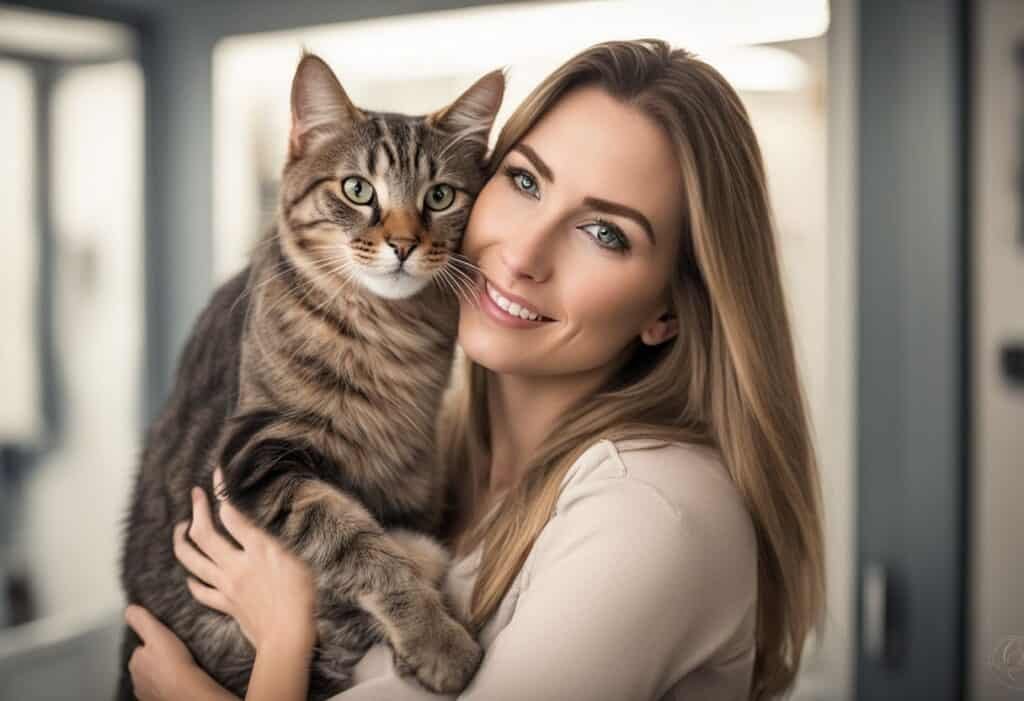
Signs Your Cat May Need to See the Vet
If your cat is experiencing litter box problems, vomiting or diarrhea, sudden weight loss or gain, or behavioral changes, it may be time to take them to the vet.
Litter box problems
If your cat is having litter box problems, it could be a sign that they need to see a vet. These problems can include urinating or defecating outside of the litter box, going more frequently than usual, or straining while using the litter box.
Litter box issues can be caused by various health conditions such as urinary tract infections, bladder stones, or even stress. It’s important to have your cat checked by a vet to rule out any underlying medical issues and provide appropriate treatment.
Remember to keep the litter box clean and accessible for your cat’s comfort too!
Vomiting or diarrhea
If your cat is experiencing vomiting or diarrhea, it could be a sign that they need to see a vet. These symptoms can indicate various health issues such as gastrointestinal problems or infections.
It’s important to monitor your cat’s condition and seek veterinary attention if the vomiting or diarrhea persists for more than a day or is accompanied by other concerning symptoms like loss of appetite, dehydration, or lethargy.
A veterinarian will be able to assess your cat’s overall health, run tests if necessary, and provide appropriate treatment to help them feel better.
Sudden weight loss or gain
If your cat experiences sudden weight loss or gain, it could be a sign that they need to see a vet. Weight changes in cats can indicate underlying health issues such as thyroid problems, diabetes, or gastrointestinal disorders.
It’s important to take notice of any significant changes in your cat’s weight and seek veterinary attention for proper diagnosis and treatment.
Behavioral changes
If your cat starts behaving differently, it could be a sign that they need to see the vet. Changes in behavior can indicate an underlying health issue or problem. Keep an eye out for things like increased aggression, hiding more than usual, excessive meowing, or litter box problems.
These changes may seem small, but they shouldn’t be ignored as they may signify something more serious. It’s always best to consult with a veterinarian when you notice any behavioral changes in your cat to ensure their well-being and catch any potential issues early on.
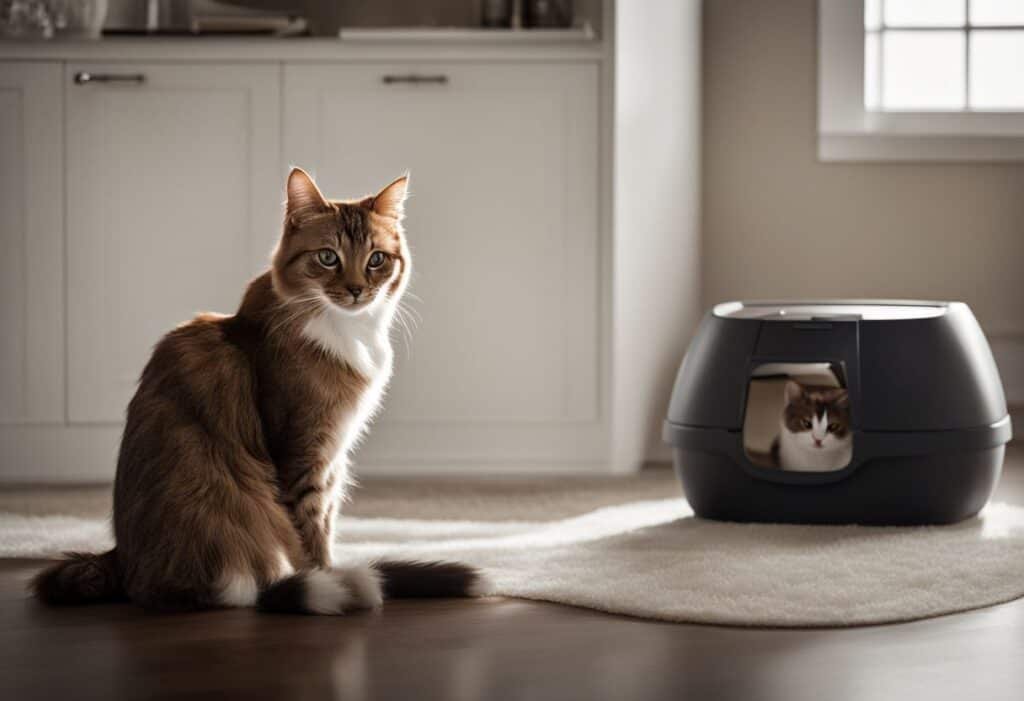
Common Questions About Cat Vet Visits
Do cats need annual vet visits?
Cats do need annual vet visits. According to the American Animal Hospital Association, it is recommended that all cats see a veterinarian at least once a year. This regular check-up allows the vet to catch any health issues early on and provide necessary vaccinations.
For kittens, these visits are even more important as they require vaccines starting from around 6-8 weeks old until they are about 4 months old. Annual vet visits are crucial for keeping our feline friends healthy and happy throughout their lives.
Is pet insurance beneficial for vet checkups?
Pet insurance can be beneficial for vet checkups because it helps cover the cost of routine examinations, vaccinations, and preventive care. With pet insurance, you won’t have to worry about paying for these expenses out of pocket.
It provides financial protection and peace of mind knowing that your furry friend’s regular veterinary visits are covered. Additionally, some pet insurance plans may offer discounts on certain services or medications.
By having pet insurance, you can ensure that your cat receives the necessary preventive care without breaking the bank.
How to handle a cat that dislikes the vet?
Some cats may feel anxious or afraid when they have to go to the vet. To help them, it’s important to gradually get them used to the experience. You can start by making their carrier a comfortable and familiar space for them.
Then, try taking short car rides with your cat in the carrier so they get used to being transported. Using pheromone sprays or diffusers that create a calming environment can also be helpful during vet visits.
If necessary, your vet might prescribe medications or sedatives to calm an anxious cat during these visits. It’s important to be patient and understanding with your cat as they learn to handle their fear of the vet.
Can you negotiate vet bills?
Vet bills can sometimes be expensive, but negotiating the cost is uncommon. Most vet clinics have fixed prices for their services that are based on the value they provide and the costs associated with running a veterinary practice.
However, there are some options you can explore to help manage the cost of your cat’s care. Some clinics offer payment plans or discounts for certain services.
When discussing treatment plans with your veterinarian, it’s worth asking if these options are available.
Additionally, pet insurance can help cover some of the costs of veterinary care, including checkups and emergencies. It’s important to research different insurance providers and find a plan that fits your budget and covers your cat’s specific needs.
Are hairballs a problem?
Hairballs can be a problem for cats. They can cause blockages in their digestive system, which leads to vomiting and discomfort. Regular grooming can help prevent hairballs, but they can still occur, especially in long-haired breeds.
If your cat is having frequent or severe hairball issues, it’s important to consult with a vet. They may recommend dietary changes or additional treatments to manage the problem.
Vets can provide helpful advice on minimizing hairball issues and offer solutions for cat owners.
What are Common Health Issues in Cats?
Cats can face various health issues throughout their lives. Some common health problems in cats include dental diseases, obesity, kidney disease, feline lower urinary tract disease, hyperthyroidism, and arthritis.
Dental diseases can cause pain and infections in a cat’s mouth. Obesity can lead to other serious health conditions such as diabetes and heart disease. Kidney disease is a common problem in older cats and can affect their overall well-being.
Feline lower urinary tract disease can result in difficulty urinating or forming crystals or stones in the bladder.
Hyperthyroidism is when the thyroid gland produces too much hormone, which can cause weight loss and increased appetite.
How often should indoor cats go to the vet?
Indoor cats should visit the vet at least once a year, as the American Animal Hospital Association recommends. However, the frequency of vet visits can depend on factors like age, lifestyle, and location.
For example, kittens need more frequent vet visits for vaccinations and wellness checks. Adult cats may only require annual checkups unless there are specific health or behavioral issues.
Senior cats may benefit from more regular vet visits to monitor their overall health and manage any chronic conditions they may have developed with age.
Do you take indoor cats to the vet?
Indoor cats also need to go to the vet. The American Animal Hospital Association recommends that all pets, including indoor cats, should see a veterinarian at least once a year. Even if they don’t go outside, they can still develop health issues and need check-ups.
Regular vet visits help ensure their overall well-being and catch any potential problems early on.
So, taking your indoor cat to the vet for routine exams, vaccinations, and preventive care like flea and tick prevention treatments is important.
Don’t forget about their dental health too!
Conclusion
Taking your cat to the vet regularly is important for their overall health and well-being. The frequency of vet visits depends on factors like their age, lifestyle, and any specific health concerns.
Kittens require more frequent visits for vaccinations, deworming treatments, and spaying/neutering, while adult cats should have annual check-ups. It’s crucial to pay attention to signs that your cat may need veterinary attention, such as changes in behavior or sudden weight loss.
Remember, regular vet visits can help catch any health issues early on and ensure a happy and healthy life for your feline friend.

